Ecological drought in the North Central United States
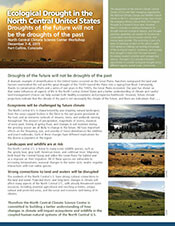 Drought is a normal feature in the North Central and Great Plains of the United States. Yet, as the region continues to warm and the impacts of climate change are more widespread, the threat of ecological drought has the potential to result in major social and ecological impacts. The Department of the Interior Climate Science Centers (CSCs) and their managing organization, the National Climate Change and Wildlife Science Center at the U.S. Geological Survey, have chosen the emerging climate science field of Ecological Drought as a research focus area. This newsletter highlights the outcomes of a two-day workshop held at the North Central CSC in Fort Collins, Colorado, as part of a series of meetings at each of the nation's eight CSCs. These workshops are aimed at collating our existing knowledge of the ecological impacts, resistance, and recovery from drought.
Drought is a normal feature in the North Central and Great Plains of the United States. Yet, as the region continues to warm and the impacts of climate change are more widespread, the threat of ecological drought has the potential to result in major social and ecological impacts. The Department of the Interior Climate Science Centers (CSCs) and their managing organization, the National Climate Change and Wildlife Science Center at the U.S. Geological Survey, have chosen the emerging climate science field of Ecological Drought as a research focus area. This newsletter highlights the outcomes of a two-day workshop held at the North Central CSC in Fort Collins, Colorado, as part of a series of meetings at each of the nation's eight CSCs. These workshops are aimed at collating our existing knowledge of the ecological impacts, resistance, and recovery from drought.
Ecological Drought in the Northeast United States newsletter
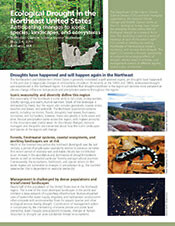 The Department of the Interior Climate Science Centers (CSCs) and their managing organization, the National Climate Change and Wildlife Center at the U.S. Geological Survey have chosen the emerging climate science field of ecological drought as a research focus area. This newsletter highlights the outcomes of a two-day workshop held at the Northeast CSC in Amherst, Massachusetts, as part of a series of meetings at each of the nation's eight CSCs. These workshops are aimed at collating our existing knowledge of the ecological impacts, resistance, and recovery from drought. The Northeastern and Midwestern United States are generally considered a well-watered region, yet droughts have happened in the past due to large-scale changes in atmospheric circulation. As recently as the 1960s and 1980s, widespread drought was experienced in this Northeast region. It is predicted that drought conditions in the region will become more prevalent as climate change influences temperature and precipitation patterns throughout the region.
The Department of the Interior Climate Science Centers (CSCs) and their managing organization, the National Climate Change and Wildlife Center at the U.S. Geological Survey have chosen the emerging climate science field of ecological drought as a research focus area. This newsletter highlights the outcomes of a two-day workshop held at the Northeast CSC in Amherst, Massachusetts, as part of a series of meetings at each of the nation's eight CSCs. These workshops are aimed at collating our existing knowledge of the ecological impacts, resistance, and recovery from drought. The Northeastern and Midwestern United States are generally considered a well-watered region, yet droughts have happened in the past due to large-scale changes in atmospheric circulation. As recently as the 1960s and 1980s, widespread drought was experienced in this Northeast region. It is predicted that drought conditions in the region will become more prevalent as climate change influences temperature and precipitation patterns throughout the region.
Ecological drought in the South Central United States newsletter
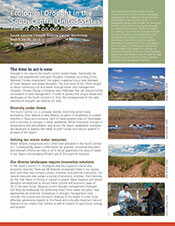 The Department of the Interior Climate Science Centers (CSCs) and their managing organization, the National Climate Change and Wildlife Science Center at the U.S. Geological Survey, have chosen the emerging climate science field of Ecological Drought as a research focus area. This newsletter highlights the outcomes of a two-day workshop held in Norman, Oklahoma, as part of a series of meetings at each of the nation's eight CSCs. The South Central CSC is a regional partnership of researchers, land managers, tribes, and others working collaboratively to develop tools and strategies that address the impacts of climate, including drought. Drought is not new to the South Central United States. Historically the region has experienced multi-year droughts. However, climate change is bringing new challenges that will require further innovations in land management.
The Department of the Interior Climate Science Centers (CSCs) and their managing organization, the National Climate Change and Wildlife Science Center at the U.S. Geological Survey, have chosen the emerging climate science field of Ecological Drought as a research focus area. This newsletter highlights the outcomes of a two-day workshop held in Norman, Oklahoma, as part of a series of meetings at each of the nation's eight CSCs. The South Central CSC is a regional partnership of researchers, land managers, tribes, and others working collaboratively to develop tools and strategies that address the impacts of climate, including drought. Drought is not new to the South Central United States. Historically the region has experienced multi-year droughts. However, climate change is bringing new challenges that will require further innovations in land management.
Ecological drought in the United States - synthesis workshop
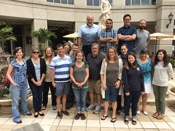 A recent workshop in June 2017 represented the culmination of almost two years of work by Simon Costanzo, Brianne Walsh, and Bill Dennison with the United States Geological Survey, summarizing the status of ecological drought science across the United States. This synthesis workshop was hosted by the National Socio-Environmental Synthesis Center (SESYNC) in Annapolis, Maryland, with representatives from eight Climate Science Centers which are part of the U.S. Department of the Interior, and where IAN had conducted workshops at each beginning in 2015. The objectives of this final workshop were to 1) synthesize our findings from those eight individual workshops into a synthesis newsletter, 2) develop a synthesis paper for publication, and 3) generate a paper outlining emerging trends in the ecological drought in the United States.
A recent workshop in June 2017 represented the culmination of almost two years of work by Simon Costanzo, Brianne Walsh, and Bill Dennison with the United States Geological Survey, summarizing the status of ecological drought science across the United States. This synthesis workshop was hosted by the National Socio-Environmental Synthesis Center (SESYNC) in Annapolis, Maryland, with representatives from eight Climate Science Centers which are part of the U.S. Department of the Interior, and where IAN had conducted workshops at each beginning in 2015. The objectives of this final workshop were to 1) synthesize our findings from those eight individual workshops into a synthesis newsletter, 2) develop a synthesis paper for publication, and 3) generate a paper outlining emerging trends in the ecological drought in the United States.
Ecological drought in the Hawaiian Islands newsletter
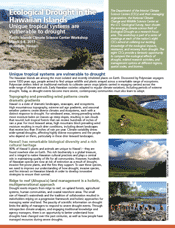 The Department of the Interior Climate Science Centers and their managing organization, the National Climate Change and Wildlife Center at the U.S. Geological Survey have chosen the emerging climate science field of ecological drought as a research focus area. This newsletter highlights the outcomes of a two-day workshop held in Honolulu, Hawai'i. The Hawaiian Islands are among the most isolated and recently inhabited places on Earth. These island landscapes and ecosystem services are uniquely susceptible to changing climate. Today, as drought events become more severe, contemporary communities must also learn to adapt. The paucity of scientific information on drought limits the ability of managers to respond to severe drought events. Through retrospective climate analyses, and engaging traditional knowledge and agency managers, there is an opportunity to better understand how droughts have changed over the past centuries, as well as how people have managed resources during severe droughts.
The Department of the Interior Climate Science Centers and their managing organization, the National Climate Change and Wildlife Center at the U.S. Geological Survey have chosen the emerging climate science field of ecological drought as a research focus area. This newsletter highlights the outcomes of a two-day workshop held in Honolulu, Hawai'i. The Hawaiian Islands are among the most isolated and recently inhabited places on Earth. These island landscapes and ecosystem services are uniquely susceptible to changing climate. Today, as drought events become more severe, contemporary communities must also learn to adapt. The paucity of scientific information on drought limits the ability of managers to respond to severe drought events. Through retrospective climate analyses, and engaging traditional knowledge and agency managers, there is an opportunity to better understand how droughts have changed over the past centuries, as well as how people have managed resources during severe droughts.
Ecological Drought in the Southwest United States
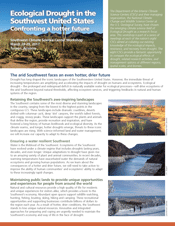 The Department of the Interior Climate Science Centers (CSCs) have chosen the emerging climate science field of Ecological Drought as a research focus area. This newsletter highlights the outcomes of a two-day workshop sponsored by the Southwest CSC and held in Tucson, Arizona as part of a series of meetings at each of the nation's eight CSCs. Drought has long shaped the iconic landscapes of the Southwestern United States. However, the immediate threat of increasing temperatures are amplifying and accelerating the impacts of drought on humans and ecosystems. Ecological drought—the prolonged and widespread deficit in naturally available water for ecological processes—will drive ecosystems of the arid Southwest beyond natural thresholds, affecting ecosystem services, and triggering feedbacks in natural and human systems of the region.
The Department of the Interior Climate Science Centers (CSCs) have chosen the emerging climate science field of Ecological Drought as a research focus area. This newsletter highlights the outcomes of a two-day workshop sponsored by the Southwest CSC and held in Tucson, Arizona as part of a series of meetings at each of the nation's eight CSCs. Drought has long shaped the iconic landscapes of the Southwestern United States. However, the immediate threat of increasing temperatures are amplifying and accelerating the impacts of drought on humans and ecosystems. Ecological drought—the prolonged and widespread deficit in naturally available water for ecological processes—will drive ecosystems of the arid Southwest beyond natural thresholds, affecting ecosystem services, and triggering feedbacks in natural and human systems of the region.
Ecological Drought in the Northwest United States
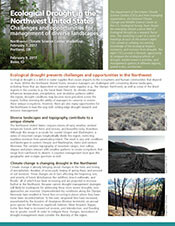 The Department of the Interior Climate Science Centers (CSCs) have chosen the emerging climate science field of Ecological Drought as a research focus area. This newsletter highlights the outcomes of two, one-day workshops sponsored by the Northwest CSC held in Portland, OR, and Boise, ID, as part of a series of meetings held at each of the nation's eight CSCs. The threat of ecological drought in the Northwest United States has the potential to result in major ecological, social, and economic impacts. The diverse ecosystems of the Northwest are shaped by unique topography and weather patterns, and each landscape is threatened by ecological drought on a local and regional level. As climate change influences temperature, precipitation, and circulation patterns within the region, drought conditions may become more prevalent across the region, further stressing the ability of managers to conserve or restore these unique ecosystems.
The Department of the Interior Climate Science Centers (CSCs) have chosen the emerging climate science field of Ecological Drought as a research focus area. This newsletter highlights the outcomes of two, one-day workshops sponsored by the Northwest CSC held in Portland, OR, and Boise, ID, as part of a series of meetings held at each of the nation's eight CSCs. The threat of ecological drought in the Northwest United States has the potential to result in major ecological, social, and economic impacts. The diverse ecosystems of the Northwest are shaped by unique topography and weather patterns, and each landscape is threatened by ecological drought on a local and regional level. As climate change influences temperature, precipitation, and circulation patterns within the region, drought conditions may become more prevalent across the region, further stressing the ability of managers to conserve or restore these unique ecosystems.
IAN partners with USGS in Puerto Rico
 IAN has partnered with US Geological Survey (USGS) to help host a series of workshops to identify and communicate drought impacts across regions of the United States. On May 30-31, Bill Dennison, Jamie Currie, and Jason Howard traveled to San Juan to participate in the latest of the series, focusing on vulnerabilities and drought-related issues specific to Puerto Rico and the US Virgin Islands. Over 50 participants explored the effects of previous droughts on agriculture, natural resources, and water supply through a series of presentations and breakout discussions. The focus turned to climate models, data gaps, and adaptation strategies to help plan for future extreme weather events. Material from this workshop will be used to create factsheets, oral histories and videos to communicate drought-related issues on the islands. Read more about the trip and here.
IAN has partnered with US Geological Survey (USGS) to help host a series of workshops to identify and communicate drought impacts across regions of the United States. On May 30-31, Bill Dennison, Jamie Currie, and Jason Howard traveled to San Juan to participate in the latest of the series, focusing on vulnerabilities and drought-related issues specific to Puerto Rico and the US Virgin Islands. Over 50 participants explored the effects of previous droughts on agriculture, natural resources, and water supply through a series of presentations and breakout discussions. The focus turned to climate models, data gaps, and adaptation strategies to help plan for future extreme weather events. Material from this workshop will be used to create factsheets, oral histories and videos to communicate drought-related issues on the islands. Read more about the trip and here.
Drought in the US-Affiliated Pacific Islands
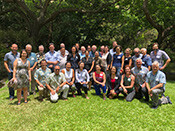 Over the last three years, the USGS National Climate Adaptation Science Center has been working with IAN to lead a network-wide initiative at each of the eight regional Climate Adaptation Science Centers to identify the impacts of drought on ecosystems across the United States and how managers can plan for these impacts and adapt to changing conditions. On August 14-15, Simon Costanzo and Brianne Walsh traveled to Honolulu, Hawaii for a workshop on drought in the US-Affiliated Pacific Islands (USAPI). The 30 workshop participants explored the effects of previous droughts on agriculture, natural resources, and water supply through a series of presentations and breakout discussions. Workshop outcomes will be summarized in a newsletter, as well as factsheets used to communicate drought related issues on the islands.
Over the last three years, the USGS National Climate Adaptation Science Center has been working with IAN to lead a network-wide initiative at each of the eight regional Climate Adaptation Science Centers to identify the impacts of drought on ecosystems across the United States and how managers can plan for these impacts and adapt to changing conditions. On August 14-15, Simon Costanzo and Brianne Walsh traveled to Honolulu, Hawaii for a workshop on drought in the US-Affiliated Pacific Islands (USAPI). The 30 workshop participants explored the effects of previous droughts on agriculture, natural resources, and water supply through a series of presentations and breakout discussions. Workshop outcomes will be summarized in a newsletter, as well as factsheets used to communicate drought related issues on the islands.
USGS Ecosystem Transformation Workshop in Seattle, WA
 The American Fisheries Society (AFS) and The Wildlife Society (TWS) have put together a team of scientists tasked with synthesizing the topic of ecosystem transformation, a top-priority in addressing emerging climate change issues in natural resource management. On November 14-16, Bill Dennison and Yesenia Valverde participated in a workshop with the team in Seattle, Washington, where participants discussed the potential for ecosystem transformation and the role they played in guiding environmental action in a changing world. Questions focused on how best to manage systems through either resisting or facilitating change in order to preserve ecological functioning and maximize ecosystem service benefits. The efforts of this workshop will culminate in peer-reviewed synthesis publications and a newsletter designed for broad dissemination.
The American Fisheries Society (AFS) and The Wildlife Society (TWS) have put together a team of scientists tasked with synthesizing the topic of ecosystem transformation, a top-priority in addressing emerging climate change issues in natural resource management. On November 14-16, Bill Dennison and Yesenia Valverde participated in a workshop with the team in Seattle, Washington, where participants discussed the potential for ecosystem transformation and the role they played in guiding environmental action in a changing world. Questions focused on how best to manage systems through either resisting or facilitating change in order to preserve ecological functioning and maximize ecosystem service benefits. The efforts of this workshop will culminate in peer-reviewed synthesis publications and a newsletter designed for broad dissemination.
USGS and IAN collaborate to report on ecological drought
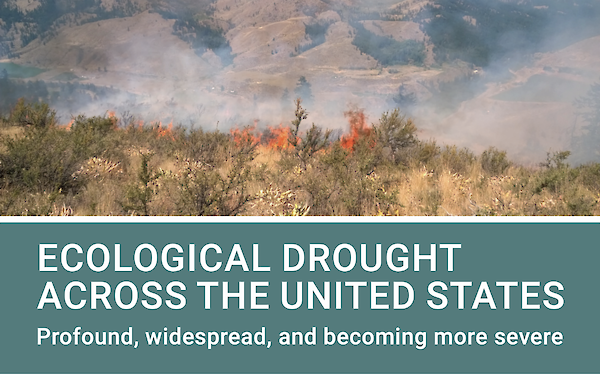
Washington, D.C., USA. In 2015, the Integration and Application Network kicked off a national-scale effort with the USGS Climate Adaptation Science Center to synthesize the impacts of of ecological drought across the country. Regional workshops were held at each of the eight regional Climate Adaptation Science Centers, as well as a two-workshop series to highlight the unique vulnerability of islands to drought. In addition, IAN staff collaborated with researchers from NC State to collect and archive oral histories of drought. Products from the two island workshops, as well as synthesis efforts at the eight regional climate adaptation science centers, were highlighted at the 2018 AGU Fall meeting in Washington, D.C. in December, and are now available online.